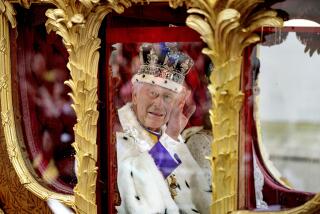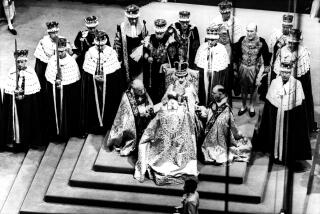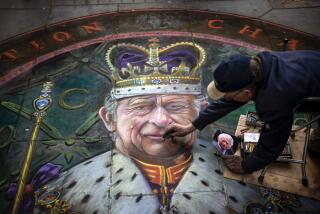Britain’s ‘Gong Show’ Is Both Praised, Damned : Awards: The Establishment loves the honors system. Critics argue they are rank political patronage.
LONDON — Insiders call them “gongs.” The Establishment says they are recognition for service. Critics argue they are rank political patronage. The Times of London writes that they are “a regular British farce.”
Whatever the view, the venerable British honors system is still going strong--and controversially. It is praised by some as rewarding endeavor for the nation; damned by others as a corruption at the heart of government.
Outgoing Prime Minister Margaret Thatcher refueled the running argument in her Resignation Honors List in December by naming to the House of Lords people whose chief virtue was the size of their monetary contributions to the Conservative Party.
She also recommended for honors Fleet Street editors whose newspapers are distinguished solely by the fervor with which they supported the prime minister when she was in power.
As the Times described the Thatcher list: “It was an odd mixture of financial and media backers and cronies, together with hard-working assistants, the ‘honor’ done to the former tainting that was done to the latter.”
Still, Thatcher (who can be addressed as Lady Thatcher since her husband was made a baronet), apparently avoided a scandal like that which attended the infamous 1976 resignation honors list of Labor Prime Minister Harold Wilson, who ennobled and knighted men later indicted for various crimes.
British honors are regularly awarded twice a year by the monarch, with the vast majority of nominees made by the prime minister and at the New Year and on the queen’s official birthday. The lists sometimes number more than 2,000 names.
The most recent, announced late Sunday, included a life peerage for mystery novelist P. D. James and a knighthood for actor Ian McKellen. Romance novelist Barbara Cartland was made a dame, the female equivalent of a knight.
Additional honors lists come when a prime minister resigns or Parliament is dissolved. Most honors are accompanied by medals, hence the nickname “gongs.”
People are nominated for honors through a complicated system of civil service committees, which act before the names reach the prime minister’s office and ultimately the palace.
Britain, of course, is not unique in dispensing honors and gongs to deserving (or undeserving) citizens: Most countries have such sought-after baubles.
The United States, for instance, has the Medal of Freedom and lesser awards for recipients, who range from former Presidents to Nobel scientists to entertainers.
The French have varying degrees of the Legion of Honor, created by Napoleon, who said that men would fight and die for bits of ribbon. Germany has replaced the famed Iron Cross with the Federal Service Cross, in several degrees.
Yet no country has quite the array of honors that a British queen can bestow upon her subjects--and also upon nationals of other nations, people like former President Ronald Reagan and Ireland’s Bob Geldof, a rock musician and famine-fund raiser, who were awarded honorary knighthoods.
Honors range from peerages and knighthoods at the top of the scale to MBEs (Member of the Most Excellent Order of the British Empire) and BEMs (British Empire Medal) at the lower level.
When the Beatles received MBEs in 1965, other recipients of the award sent back their gongs in protest.
Peerages (usually life barons) and knighthoods (known as a “K”) generally go to retiring political, government, and military officials as well as heavy contributors to the ruling party.
From a certain British point of view, one virtue of a peerage (Lord Smyth) or knighthood (Sir John Smyth) is that the wife of the recipient may formally be addressed as Lady Smyth instead of Mrs. Smyth.
Somewhere in between orders of knighthoods come those awards more truly concerned with achievement: the Order of Merit, limited to 24 members, and the Companion of Honor.
Towards the lower end of the scale, awards are given to sports figures like snooker champ Steve Davis and England soccer coach Bobby Robson, and to government retainers for a lifetime of dedicated service: a doorman at No. 10 Downing Street or a personal maid at Buckingham Palace.
By far the most numerous awards in the Queen’s List go to middle-level government employees: heads of city government, assistant ministers in departments, serving officers and diplomats, postmasters, police officers, senior teachers and those involved in charitable work.
All recipients of awards are entitled to put the initials after their names in descending order of precedence. Hence, former Foreign Secretary Lord Carrington, KG (Knight of the Garter), CH (Companion of Honor), KCMG (Knight Commander of the Order of St. Michael and St. George), MC (Military Cross), PC (Privy Counselor).
Most royal orders have several degrees: The Order of the British Empire, for instance, has Knight (or Dame) Grand Cross, Knight Commander, Commander, Officer, and Member.
When author Nancy Mitford was given a CBE, she remarked: “I didn’t think there was a BE any longer.”
The Most Distinguished Order of St. Michael and St. George is generally reserved for foreign service officers. The degrees are referred to around the Foreign Office, in ascending order, as CMG (Call Me God); KCMG (Kindly Call Me God); GCMG (God Calls Me God).
The top order of knighthood is The Most Noble Order of the Garter, founded in 1348, whose 24 members are personally selected by the queen, and include former Labor Prime Ministers Harold Wilson and James Callaghan.
One gruff old duffer who was a friend of the Royal Family, on being named a KG, reportedly remarked: “What I like about it is there’s no bloody nonsense about merit.”
Most recipient of honors receive them personally from the queen in an investiture ceremony at Buckingham Palace that may come several weeks after the announcement, depending on the numbers of the awards and her schedule.
Though egalitarian critics may deplore it, the honors system follows a hallowed British tradition: The aristocracy itself is based on the fact that monarchs have always rewarded favorites--competent or not--with titles, lands and privileges.
In fact, the custom of awarding knighthoods can be traced back to the 9th Century under King Albert the Great. On inheriting the crown in 1603, James VI of Scotland created 906 knights within four months, dubbing 46 before breakfast on one morning alone.
Earlier this century, Prime Minister David Lloyd George openly sold honors as a way of raising funds for his Liberal Party. His bagman, Maundy Gregory, flagrantly listed the going rate for peerages at 100,000 pounds, then about $500,000; baronetcies (heredity knighthoods) at 30,000 pounds, and knighthoods at 10,000 pounds.
The resulting uproar led King George V to declare Lloyd George’s freewheeling style with honors an insult to the monarchy, and a Political Honors Scrutiny Committee was set up to evaluate submissions.
The Labor governments also did not award heredity peerages but created only barons for life; the title does not pass through the male line as is customary for lords.
Peers sit in the House of Lords and range from dukes, through marquesses, earls, viscounts and barons. Sir Winston Churchill, KG, was reportedly offered a dukedom but declined in order to sit in his beloved House of Commons.
Thatcher restored the practice of granting honors for political service to faithful Tory party retainers and contributors, and she also recommended three heredity peerages: the traditional earldom for former Prime Minister Harold Macmillan (Wilson and Callaghan accepted only life peerages) and viscountcies for former Deputy Prime Minister William Whitelaw and former Speaker of the House George Thomas.
More to Read
Sign up for Essential California
The most important California stories and recommendations in your inbox every morning.
You may occasionally receive promotional content from the Los Angeles Times.










